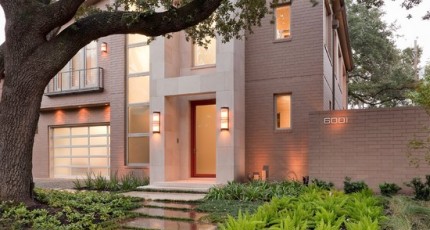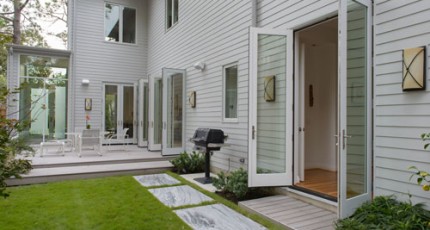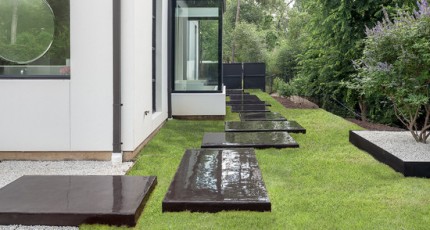Beautiful Garden Design


The heart and soul of landscape architectural services is schematic design of the general landscaping plan. We develop this plan through a series of consultations with the client. During these meetings, we discuss the intentions that the client has in mind for the project. Over the years we have discovered that most people have a definite sense of what they want, but they have little ability to articulate the specifics of their desires in terms of design, form, and structure. It is our professional obligation to help clarify these specifics by asking the right questions, then using the answers we glean through the consultation process to develop a graphical frame of reference for the entire plan of action.
The second phase of landscape architectural services involves the drafting and publication of construction documents. Many aspects of both commercial and residential landscaping require the building of different types of structures on the property. To ensure excellence, we locate and subcontract the finest professionals in specific disciplines. To bring all parties to the table, and to keep everyone on the same page, to have all contracts and insurance forms completely filled out and itemized in the form of checklists prior to the initiation of any actual labor. This saves time and money on material costs and labor, prevents confusion, and manages the entire process as one consistent current of teams working together as teams.
Landscape architectural services are predicated on detailed layout plans prior to the inception of actual building. This helps each subcontractor entity remain fully aware of what we ultimately intend to do on the property from an aesthetic perspective. This awareness allows them to better concentrate their energies when they see how their specific expertise fits into the big picture. This is particularly true when it comes to special measures such as tree preservation that must sometimes be taken into account when building around wooded areas or trees with extensive root systems. It is also particularly necessary for custom pool design. When pool contractors are made conscious of the many elements we ultimately intend to add to the landscape, they will be better able to build the pool proportionally in respect to home architecture, custom gardens, courtyard design, and general back yard landscaping.
Hardscape plans help both our team and the teams we bring in to separate the inorganic elements of landscape architectural services from the organic aspects of design. Plans for structures such as paved driveways, brick walkways, custom fountains, patios, seating areas, fences, and walls have to be carefully drafted to avoid exceeding aesthetically balanced dimensions, and to ensure as well that they respect the living greenery of the property and support the architectural themes of the house.
Elevation drawings come next. While it is true that Houston is built in one of the flattest regions of the nation, there are still significant variations in elevation throughout the many different parts of our city. Many neighborhoods lie near floodplains that were once part of the massive bayou system prior to the construction of our storm sewers. Even though these storm drains work very well to siphon off water once the rain stops falling, during heavy, prolonged rains water will rise very quickly in streets and driveway areas. When this occurs within a yard, it puts vegetation and structures at risk of water damage if too much rainwater collects on the property. Knowing where the high ground and low ground is, so to speak, helps us then develop strategies for the mechanical aspects of landscape architectural services: grading plans and irrigation plans
Grading is the science of altering land elevation for the purposes of improved water runoff. Its goal is to conceal drain systems as much as possible so they do not diminish the aesthetics of the landscape. Building custom and concealed drains is a relatively simple matter for our team of experts. However, when it comes to getting the water to these drains, it may require some subtle, albeit highly significant alterations, of the slope of the soil and the hardscape forms. We might have to add fill dirt to the yard in order to get the water to flow more quickly toward a storm sewer or nearby bayou. Or, we may need to build a small stream that will add both a decorative element to the yard and an emergency drainage channel. For paved areas and custom patios, we will have to slope the concrete or stone very precisely so that it will effectively drain water at a rapid, even rate, yet remain unnoticed by people walking over the pavement during dry, sunny days.
The final step in planning landscape architectural services is the planning of irrigation networks for water gardens, trees, hedgerows, and flower beds during the summer and early fall months. Irrigation systems are required for many of the species we plant that are not indigenous to our area and that cannot survive in an area like ours where rains are more seasonal than they are consistent. Again, the art of concealment is the key to preserving the greenery. Our irrigation systems are generally hidden beneath plants so that water is delivered to the roots beneath the leaves. This makes for a better visual presentation, and it is more beneficial to plants than hoses and sprinklers because it prevents fungus from growing on the leaves.
In conclusion, we can say that the key operative term in landscape architectural services is architecture. In much the same manner than an architect develops the schematics of a building project step by step, so our team develops each phase of professional landscape design as a series of documents and drawings that maintain the focus of the project from start to finish so that all elements of the landscape blend together at the end of the day to create an experience that is truly unique and personal to the sensibilities and intentions of the individual client




